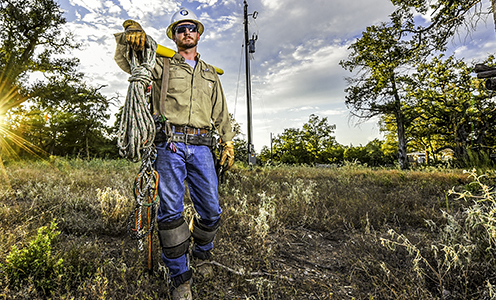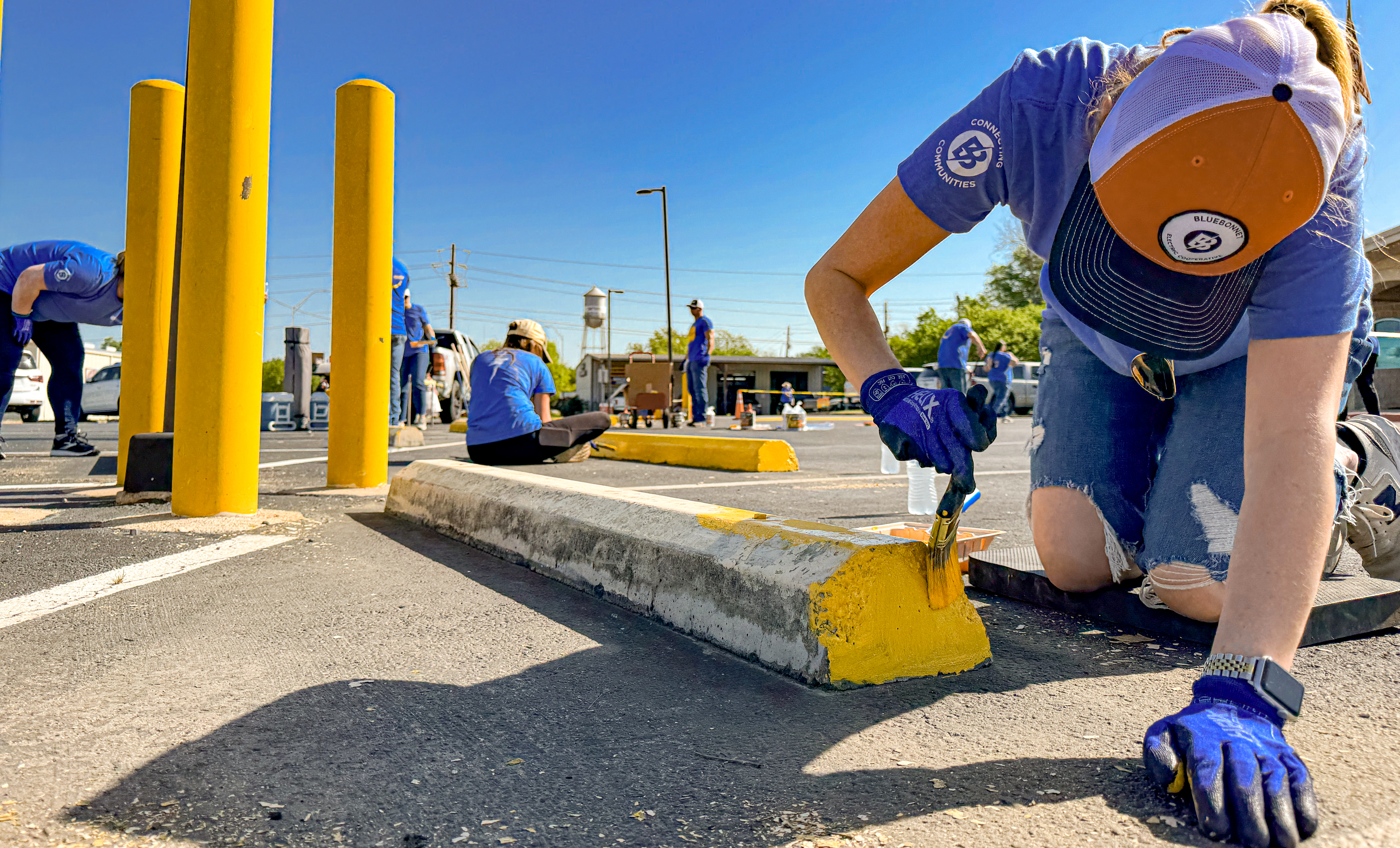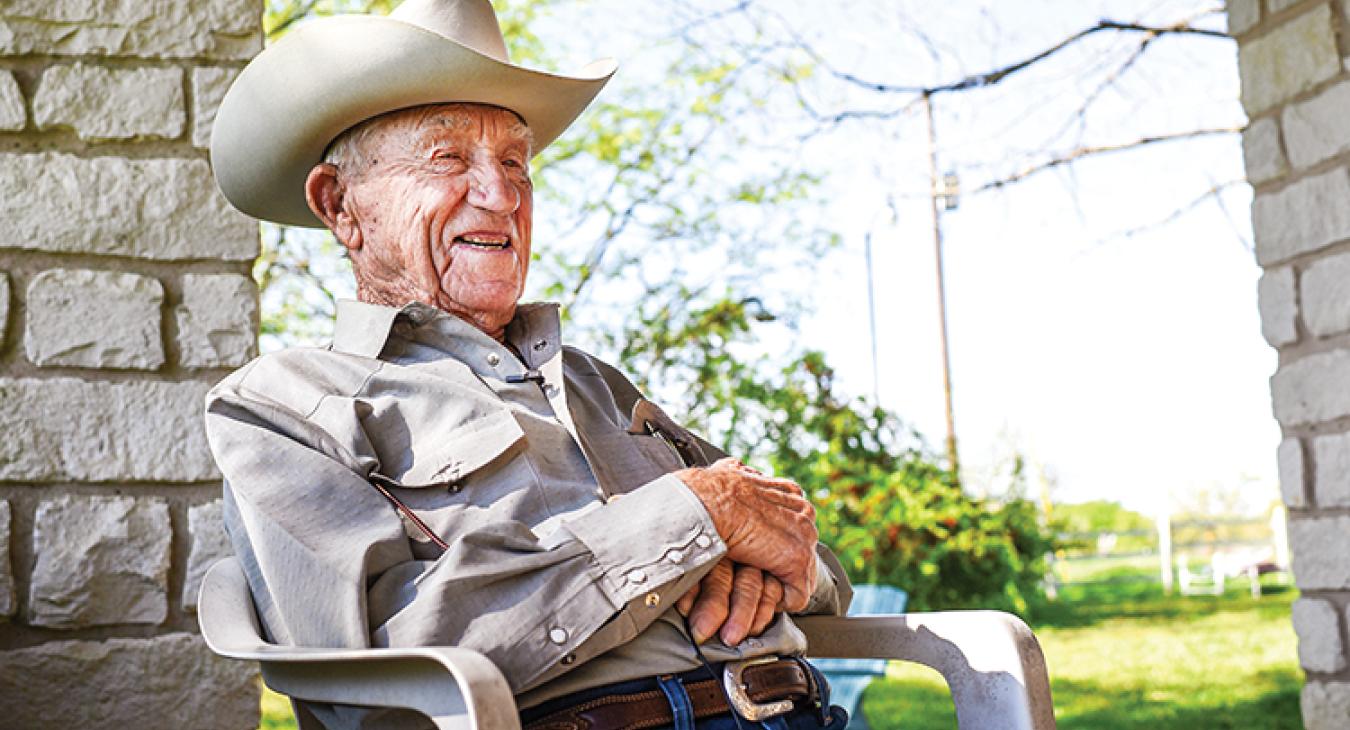Arthur Goertz sits on the front porch of his neatly kept country home, looking out over the rolling pastureland and Post Oak savannahs of southwestern Bastrop County, his eyes squinting a bit under the brim of his Resistol.
BY CLAYTON STROMBERGER
Arthur Goertz sits on the front porch of his neatly kept country home, looking out over the rolling pastureland and Post Oak savannahs of southwestern Bastrop County, his eyes squinting a bit under the brim of his Resistol.
He can see it all, like it was yesterday — the old family places with wood stoves, that pollywog-fishing spot on Walnut Creek where he’d go with his father and Uncle Albert, the ranches where he worked cattle on horseback for decades, and the spot in Rockne where he met his young bride-to-be Erlene after coming back from service with the Navy in World War II.
Each is a touchstone of almost a century of living, working and raising a family — all within a few miles of this very spot.
“My grandparents lived right up here in Rockne, half a mile from here. That’s where we all grew up,” he says in a strong, slightly husky voice with a hint of a German-Texan lilt. The community was mostly settled by German Catholic immigrants, including Arthur’s great-grandfather Philip Goertz, and was renamed from “Hilbigville” in the early 1930s in honor of Notre Dame football coach Knute Rockne, who had just died in a plane crash.
Goertz, born in 1923, was one of nine children of Pius and Sadie Goertz, who lived between Red Rock and Rockne, near what is now FM 20. Arthur lived in that home until he left to serve in the Navy after Pearl Harbor, early in 1942, according to his son A.J. Goertz.
“Grandpa and Grandma Goertz, they had around 40 to 50 grandkids.” Goertz pauses to let that image sink in and then breaks into a grin and laughs, as he often does in telling a tale. “We’d get together every weekend. See, they had nine children, and in our family, we had nine. That got pretty thick there for a while. We all grew up here, lived here together. Times were hard, and we had very little money, and we raised everything we needed to eat. And we didn’t have money to buy nothing and didn’t need nothin’. We raised our own beef, our own pork and vegetables. Didn’t have automobiles, no electricity, had to walk to school.”
Goertz is a legend in these parts, a beloved local figure who still attends Mass every Sunday morning a mile and half down the road at Sacred Heart Catholic Church, where he and Erlene were married in 1951. “Oh, Arthur, he’s in his 90s, and he still rides a horse!” remarked one neighbor. Goertz’s oldest son, A.J., reports that the family finally persuaded Arthur in 2017 to transition from horseback to a four-wheeler for his perambulations around the property. He will be 96 in September and still lives on several hundred acres off Lower Red Rock Road in the house where he and his wife raised five children.
Erlene canned everything you can think of, drove the local school bus and filed dispatches about Rockne for the Bastrop newspaper. She died 12 years ago. Their youngest daughter, Julaine Goertz, moved in a few years back to help take care of Arthur. Rambling around the property are his horses, Little Joe and Moon, and his dogs, Buster and Lulu.
There was the time before electricity came, and the time after, and Arthur Goertz has lived a full life in both.
“We had coal oil lamps and didn’t have radio or TV or ice boxes, nothing like that,” Goertz recalls. “And we had these old things they called lanterns — had a handle on ’em, run with kerosene. We’d light it sometimes, go out to the smokehouse at night, get some sausage, something like that. Coal oil lamps — they were hell. You had to clean them. We didn’t have time to study at day; we had to work as long as it was daylight and then had to study our lessons at night with those coal oil lamps.”
Goertz had been around electricity a bit before Bluebonnet Electric Cooperative (then called the Lower Colorado River Electric Cooperative) came to the area in 1939, because a Delco generator provided power for lights at the school and church. But when he was 14 or so, the mysteries of modern technology came to Rockne. Goertz remembers how magical electricity was for a country boy who’d mostly grown up without it.
“You could reach up there and pull a string, and the light would come on!” Goertz recalls, a hint of astonishment still in his voice. “And then we got a radio, and you could turn this button here, you know, and it’d make music, and you’d hear words. You’d think, ‘How can that be?’ ” He laughs heartily. “We all grew up and got used to it.”
His parents bought an icebox at some point and then a stove, and gradually the somewhat spartan and functional look of their rural home was transformed. “When electricity got here, it was a new world,” Goertz says. “We had one clock, about so tall” — he holds his hand out a few feet above the ground — “and it was mounted in the corner of the living room, the only one we had in the house. Now you come home, and you’ve got clocks in every room, and everywhere there’s light, things like that. But we grew up without that for a loooong time and enjoyed it.” He laughs again. “Never knew better. We had to walk to school, didn’t have nothing but a (Ford Model T), and it wasn’t working about half the time, no mechanics around here. But we had a hell of a life here. We had plenty of things to do, work, good health and enjoyed it. Just went through life.”
Growing up in rural 1930s Texas, young Goertz, his parents, siblings and extended family had to be self-sufficient and live off the land to a degree that is almost impossible to imagine today. “We milked cows, we grew potatoes, tomatoes, figs, plums, peaches. You name it, we had it — sweet potatoes, onions, shallots. Papa had four mules and two horses, each with a stable, each one had their own trough where we put the hay. We baled our own hay, planted our own hay.”
For water, a cistern on a cedar post caught the rain. “We had to go to the tank with a pair of mules and two or three barrels, and get them full of water, and Mama would put ashes in the barrels, and that was what we washed our clothes with. You’d boil the water, put in the homemade soap. We had about everything you could think of.”
It was a Tom Sawyer and Huck Finn existence. When they weren’t doing chores, Goertz and his brothers and cousins roamed the woods and hunted green frogs. Armed with slingshots, they staged fierce raids on wasp colonies. As a teen, Goertz developed a side business selling possum hides.
What he knows best is cattle. “I owned my first cow when I was 14 years old,” he says. Papa gave each son a calf when he turned 14. Goertz hasn’t had “one day since then without owning a cow.” For decades, Goertz, his horse and his dogs worked cattle on nearly every ranch and savannah patch in these parts. Goertz was the man to call in Bastrop County and adjoining counties if cows went astray or a herd needed expert tending. Goertz trained generations of Rockne-area youth to be cowboys and do things the right way.
That’s what inspired son A.J. to come up with a poetic inscription for his father’s tombstone. The stone is already in place, right next to Erlene’s at the Sacred Heart Catholic Cemetery next to the church. Erlene’s reads, Rockne’s Comical Roving Reporter, for her many years as the Rockne journalist.
“We put it on his tombstone already,” A.J. says: The Rockne Cowboy.
If Arthur Goertz had his way, he’d still be out there in the saddle, collecting more stories. “I’ve been around the world and the United States,” Goertz says, looking off over his land, “and I never saw a place I loved any better than here. And it’s not all that great, it’s just me. I’m country, and I was born and raised that way, and I enjoyed it, and I still enjoy life. I still feel good and still like to get out there and work.”
But these days, he takes each day as it comes, and though he’s hard of hearing, he loves to spend time visiting with family and checking on the homestead. He’s slowed by age, of course, but still remarkably spry, and there’s always something to do, someone to greet. He doesn’t mind having company each afternoon at sundown for his nightly vodka and cranberry juice and storytelling session on the porch.
If electricity seemed like a magical force to Goertz when it first came to the Rockne area, it certainly still seems that way to him today. His children help him navigate the ever-changing world of technology. He doesn’t have a smartphone but has used one now and then.
“I just don’t know,” Goertz says, “I can’t stay up with the inventions they’re making today. You can stand out here and mash a button and talk to my daughter in Colorado, and she might be out in the yard choppin’ cotton, but you can get her. I can’t figure that out.” He pauses and laughs. “It ain’t real!” And he laughs again, shaking his head at the wonder of it all.





